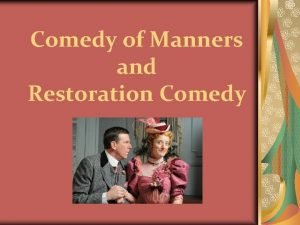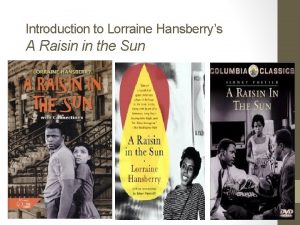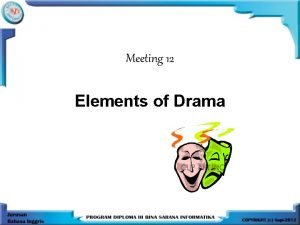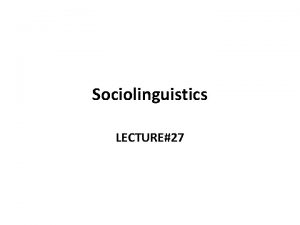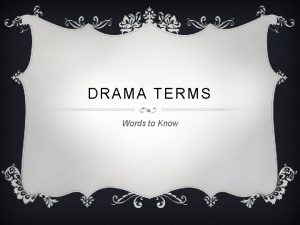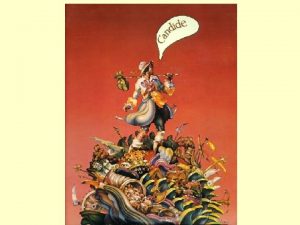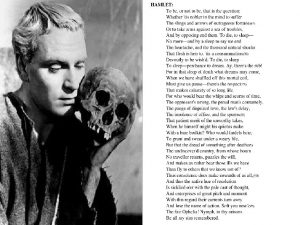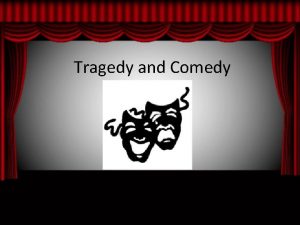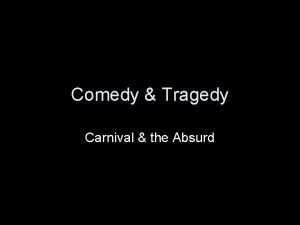Varieties of Drama Introduction Tragedy and comedy are


















- Slides: 18

Varieties of Drama

Introduction Tragedy and comedy are the two chief divisions of drama. Some plays that have the qualities of tragedy and comedy are called tragicomedies Some serious plays do not fit the qualifications of tragedy but are serious in nature are simply called dramas

Tragedy A tragedy is a play in which the protagonist fails to achieve the desired goals or is overcome by opposing forces Strong emotions, such as love, hate, ambition, jealousy and revenge move the audience to empathize with tragic figures. Comedies, on the other hand, often depend upon local, regional or topical situations

Tragedy When a person of stature, struggling mightily against dynamic forces, finally falls, the audience experiences what Aristotle termed catharsis, a purging or cleaning that comes as result of an emotional release. Another characteristic of tragedy is inevitability. What is going to happen will happen. There is no way to prevent the protagonist’s tragic fall. “star crossed lovers”

Tragedy Pathos is another characteristic of tragedy. Pathos is the power to arouse feelings of pity and compassion in an audience.

Tragedy Great tragic characters have 5 things in common: They know what they stand for and do not swerve from that stand They make no apology for their actions They set goals based on their dogmatism They know that almost everything worth having demands some sacrifice They are willing to make the sacrifice themselves, never asking another to do what they alone can do

Comedy is derived from a Greek word, komos, meaning “festival or revelry” Comedies are usually “societal, ” meaning that all the characters come together at the end of the play. Comedy is built around character, situations or dialogue

Types of Comedy Low comedy- a play that is quite physical, sometimes vulgar, and highly exaggerated in style and performance Farce- the type of comedy when everything is done strictly for laughs Burlesque- common form of low comedy, seen in television skits and in performances by stand up comedians; exaggerated acting often referred to as “ham”

Types of Comedy Middle Comedy- a kind of comedy that includes humor, such as romantic comedy, sentimental comedy, melodrama or social drama Romantic comedy- a play that presents life as we would like it to be Fantasy- deals with unreal characters in dreams and scenes imaginary in time and place Sentimental comedy- a play in which the need of people to have faith in others and to lose themselves in the lives of others like themselves is met Melodrama- a serious play written to arouse intense emotion by blood curdling events, terrific suspense, and horrifying details centering on murders, greed and revenge Social drama- a problem play which seeks to right the wrongs of society

Types of Comedy High Comedy- a play that includes comedy of manners and satire and uses clever lines, word play and allusions Comedy of manners- a play that laughs at a particular segment of society, usually the upper class Satire- a humorous attack on accepted conventions of society, holding up human vices and follies to ridicule

Exit Ticket What is the appeal of tragedy for an audience? What makes the roles of tragic protagonists so challenging for actors?

Style- the way in which a play is written, acted and produced

Representational and Presentational Most plays are representational. Sometimes this style is called “fourth wall” theatre The play is performed as if the audience is watching the action through an imaginary fourth wall The presentational style acknowledges than an audience is present.

Realism and Naturalism Realistic plays present life as it actually is- often unpleasant and unhappy, but not necessarily so Naturalism is often sordid and shocking.

Symbolic In a symbolic play, the dramatist emphasizes theme by having characters, props, even sets, stand for something else

Allegory The characters in an allegory definitely represent abstract qualities like Truth, Justice, and Love or personalities like Death, God, Humanity as characters in a play that has as its goal the teaching of moral concepts

Avant-Garde is used to identify whatever the new and experimental styles of any art form happen to be at the time

Exit Ticket Think of a play you have seen with a particular style, such as a romantic fantasy. Discuss the sources of the production’s style. How did the script, set, lighting, costumes, and actors’ diction and gestures contribute to the style?
 Antigentest åre
Antigentest åre Comedy of manners history
Comedy of manners history Examples of comedy of manners
Examples of comedy of manners Chapter 6 varieties of drama
Chapter 6 varieties of drama Varieties of drama
Varieties of drama Is romeo and juliet a tragedy or comedy
Is romeo and juliet a tragedy or comedy Comedy vs tragedy shakespeare
Comedy vs tragedy shakespeare Ironic and humorous plays
Ironic and humorous plays Macbeth act 2 character map
Macbeth act 2 character map Greek tragedy vs shakespearean tragedy
Greek tragedy vs shakespearean tragedy Nitrofurantone
Nitrofurantone Poems with literary devices highlighted
Poems with literary devices highlighted What are drama elements
What are drama elements Greek tragedy vs shakespearean tragedy
Greek tragedy vs shakespearean tragedy What are the characteristics of shakespearean tragedy
What are the characteristics of shakespearean tragedy Market forms of shellfish pictures
Market forms of shellfish pictures Language dialect and varieties in sociolinguistics
Language dialect and varieties in sociolinguistics Language dialect and varieties
Language dialect and varieties Linguistic varieties and multilingual nations
Linguistic varieties and multilingual nations

